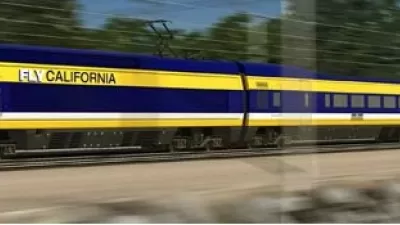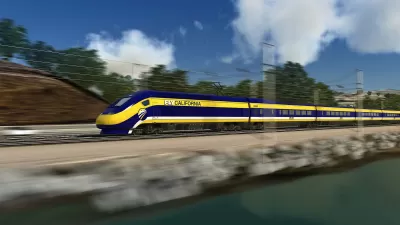One positive thing to be said about a project that's been declared on life support by even many of its supporters since a court ruling denied its chief funding source: the Calif. HSR Authority sure is resilient. New funding sources may keep it alive.
Back in January when Gov. Jerry Brown announced that he would tap AB 32's cap and trade fund (technically called the Greenhouse Gas Reduction Fund), I had regrettably characterized it as a "Hail Mary Pass". Clearly, it wasn't. It was more like the major game plan for the governor's embattled rail project.
The Wall Street Journal's California correspondent, Alejandro Lazo, elaborates on the funding possibilities that the rail authority is considering using with the GHG Reduction Fund allocation as its base.
Securing cap-and-trade dollars for the project could give the state's high-speed rail authority an important boost by providing a stable source of funding, experts said. The state said it could tap federal loans through the Transportation Infrastructure Finance and Innovation Act (TIFIA) or the Railroad Rehabilitation and Improvement Financing program
The state also said it could use private activity bonds, issued by a state for a public project for private users, as well as private sources such as bank loans, taxable bonds and equity investment.
There are several caveats to this approach.
- The governor places the allocation in his budget, but it is the legislature that approves it and authorizes the spending. According to Kathy Hamilton of Cal Watchdog in Part 3 of a series on California’s high-speed rail blueprint, "Gov. Jerry Brown sought $250 million in the next budget cycle for the high-speed rail project. In the future, he also wants to take one-third of the money from the state’s quarterly cap-and-trade auctions of greenhouse gas emission credits."
- There will be lots of competing requests for this new source of funding which will grow considerably next year with the addition of motor vehicle fuels. Senate Leader Darrell Steinberg (D-Sacramento) dropped his proposal to apply a carbon tax to those fuels in lieu of carbon trading.
- The state's non-partisan legislative analyst indicates that the project emits rather than reduces greenhouse gases during its construction which technically may violate AB 32 policies.
- Finally, AB 32 terminates in 2020 - it will have to be renewed. We posted an article about a bill introduced to do just that.
In any case, tapping (or draining, depending on one's perspective) the Greenhouse Gas Reduction Fund "would give the authority more credibility and, at least up to the amount guaranteed, they wouldn't have to go begging the legislature for money every year," said Louis S. Thompson, chairman of the California High-Speed Rail Peer Review Group, an independent overseer of the project."
FULL STORY: California Eyes Plan for Bullet Train

Planetizen Federal Action Tracker
A weekly monitor of how Trump’s orders and actions are impacting planners and planning in America.

Restaurant Patios Were a Pandemic Win — Why Were They so Hard to Keep?
Social distancing requirements and changes in travel patterns prompted cities to pilot new uses for street and sidewalk space. Then it got complicated.

Map: Where Senate Republicans Want to Sell Your Public Lands
For public land advocates, the Senate Republicans’ proposal to sell millions of acres of public land in the West is “the biggest fight of their careers.”

Maui's Vacation Rental Debate Turns Ugly
Verbal attacks, misinformation campaigns and fistfights plague a high-stakes debate to convert thousands of vacation rentals into long-term housing.

San Francisco Suspends Traffic Calming Amidst Record Deaths
Citing “a challenging fiscal landscape,” the city will cease the program on the heels of 42 traffic deaths, including 24 pedestrians.

California Homeless Arrests, Citations Spike After Ruling
An investigation reveals that anti-homeless actions increased up to 500% after Grants Pass v. Johnson — even in cities claiming no policy change.
Urban Design for Planners 1: Software Tools
This six-course series explores essential urban design concepts using open source software and equips planners with the tools they need to participate fully in the urban design process.
Planning for Universal Design
Learn the tools for implementing Universal Design in planning regulations.
Heyer Gruel & Associates PA
JM Goldson LLC
Custer County Colorado
City of Camden Redevelopment Agency
City of Astoria
Transportation Research & Education Center (TREC) at Portland State University
Camden Redevelopment Agency
City of Claremont
Municipality of Princeton (NJ)




























